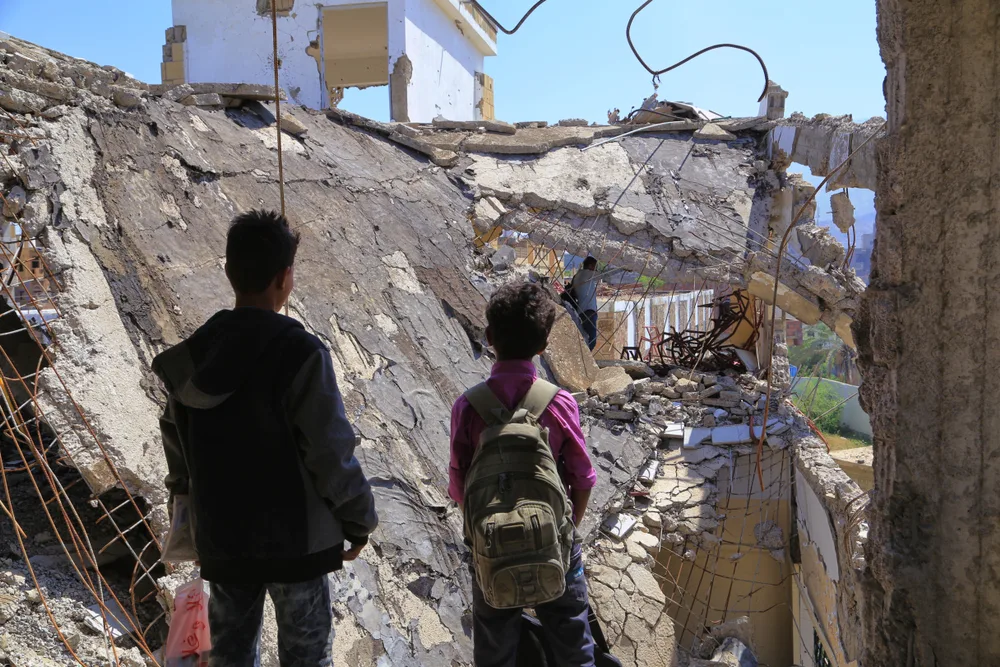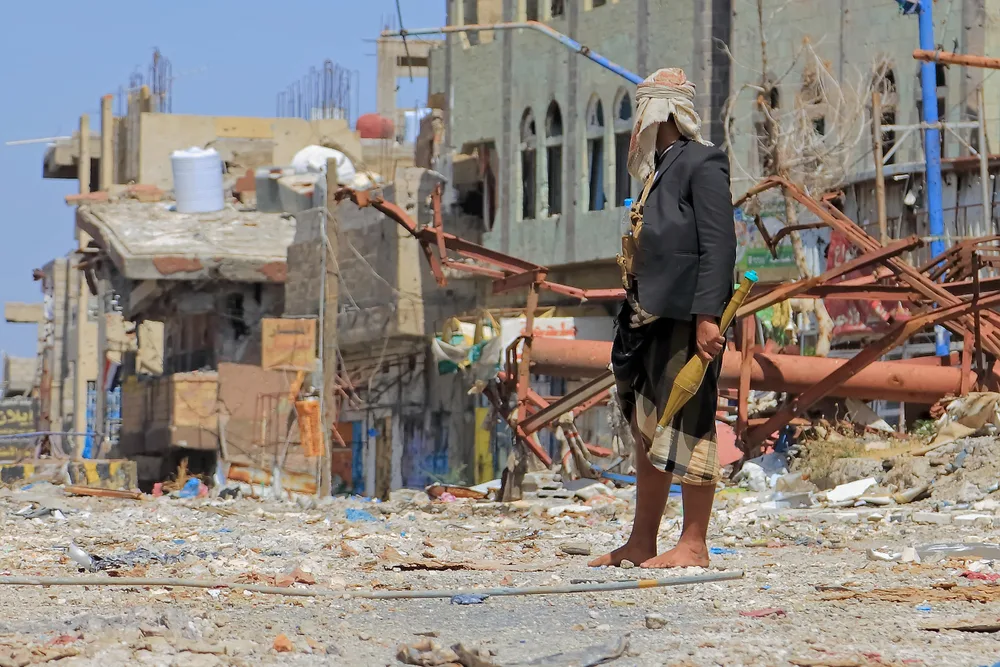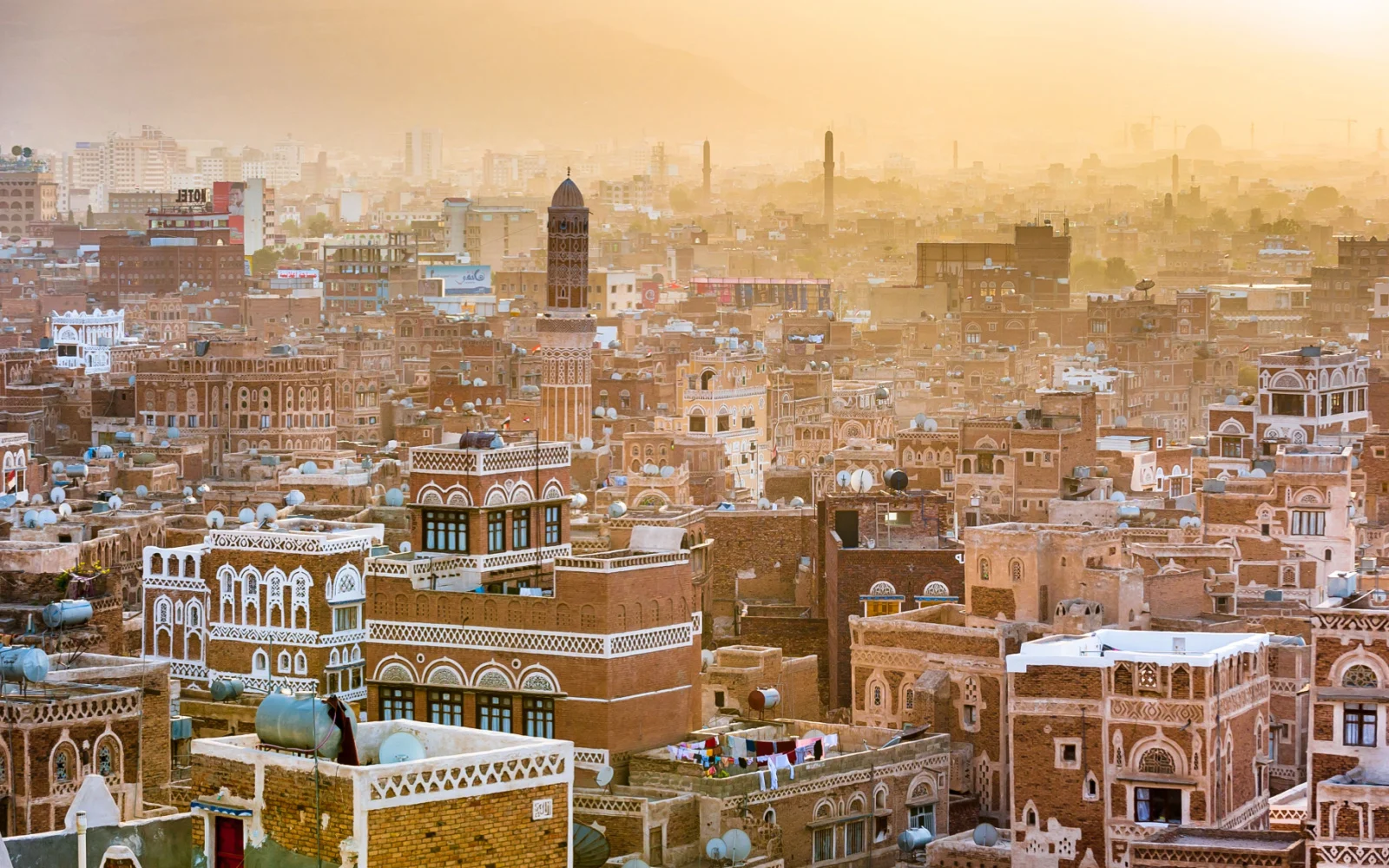Yemen is an off-the-beaten-path tourist destination in the Middle East that offers a rewarding glimpse into unique nature, culture, and history to those who do come here.
Lovers of natural beauty should head to Socotra Island, a place off the shore of Yemen with a landscape, flora, and fauna like nowhere else in the world.
Lovers of history will enjoy the UNESCO-protected historic buildings of Old Sana’a and the Al-Qahira Fortress. You shouldn’t pass up an opportunity to try out Yemeni cuisine and coffee — many historians credit Yemen as the place where coffee as we know it was invented.
But while there’s countless amazing sights to see, is Yemen safe to visit? Here’s our take.
Is Yemen Safe to Visit in 2025?

Yemen / Taiz City – Nov 21 2018 Rocket shells fired by the Houthis on residential neighborhoods and destroyed neighborhoods and houses in the city madly/Anasalhajj/Shutterstock
No. Unfortunately, Yemen is not safe to visit right now. The country has been involved in a brutal civil war for nearly a decade, which has led to civil instability, economic collapse, and famine.
The civil war also means there is no government controlling much of Yemen, creating the perfect environment for crime and lawlessness to flourish.
All governments around the world are fairly united in their message — don’t travel to Yemen.
The Indian embassy tells its citizens not to travel to Yemen under any circumstances and with any mode of transportation, and it even threatens citizens with passport impounding if they ignore these regulations.
The United States government also tells its citizens not to travel to Yemen, putting the country under a Level Four travel advisory. The main reason why you shouldn’t travel to Yemen is the ongoing brutal civil war.
The Council on Foreign Relations helpfully provides a breakdown timeline of the civil war. The war began in 2014 as a conflict between Shi’ite Houthi rebels and the majority Sunni central government.
Since then, there’s been an ongoing struggle between Houthi rebels and supporters of the former (now-killed) president, made worse by the influx of foreign weapons and aid as the regional powers of Saudi Arabia and Iran are treating Yemen as a proxy conflict.
Nearly ten years of brutal civil war have taken a heavy toll on Yemeni society. According to UN estimates, nearly 60% of people killed (or expected to die if the conflict doesn’t end soon) will die of collateral causes such as famine.
Millions of people are at risk of famine and disease outbreaks such as cholera.
Against such an environment of instability, it’s nearly impossible to guarantee that a foreign visitor would be safe in Yemen. Local authorities and people simply do not have the resources to take care of a foreigner when they cannot take care of their own people.
While some adventure tourists are still traveling to Yemen, many locals are angry at people who continue to visit and take away resources that could be used to deliver humanitarian aid.
The deeply unstable situation also allows crime to flourish, including:
- Terrorism
- Kidnapping
- Armed carjacking
- Theft
- Armed robbery
- Sexual harassment and assault
The risks are far too high to justify going to Yemen right now. It’s better to learn more about the country and hope that the war ends soon, not just for your own travel plans, but for the well-being of the poor people who live in the country.
Crime in Yemen

Anasalhajj/Shutterstock
With an ongoing brutal civil war, crime is probably the least of your worries when visiting Yemen. However, crime is omnipresent in the country, so it is good to be aware.
Conflict leads to an increase in crime because there is a breakdown in authority, creating the perfect conditions for unsavory actors such as bandits to operate. Plus, with an ongoing war, it is easier for anyone to get their hands on a weapon, including criminals.
It is difficult to get accurate, recent crime statistics for Yemen. Due to the ongoing civil war, there is no single government that has control over the territory, let alone an authority that can accurately prosecute crimes — collecting data is, at this point, a distant afterthought.
The most recent homicide statistics available to the World Bank come from 2013, when Yemen experienced 7 homicide incidents per 100,000 people.
This homicide rate was already high compared to the global average, and experts estimate that the crime rate has increased in the years since due to the lawless atmosphere of Yemen. Yemeni civilians are often the victims of war crimes perpetrated by both sides in the conflict.
The Global Centre for the Responsibility to Protect lists common war crimes for which there is evidence in Yemen, including airstrikes targeting civilians, torture of detainees, sexual assault, and even attacks on children.
The lawless nature of Yemen’s government right now also creates the perfect environment for organized crime groups, including domestic and international actors, to thrive.
These groups are behind crimes such as organ selling, arms trafficking, the illegal drug trade, and oil smuggling.
In remote areas, armed tribes are imposing their own “laws” and undertaking criminal activities such as kidnapping, banditry, and smuggling. Many Houthi leaders are linked to organized crime.
The war also created the perfect conditions for the black market to flourish. Besides organized crime, conditions in Yemen are such that they are pushing many ordinary people into criminality.
For a Yemeni whose family is on the brink of starvation, a foreigner’s thick wallet, passport with the possibility of visa-free travel, or smartphone that costs more than an annual salary in the country is a tempting prospect.
Although there is no data due to the difficulty of gathering good crime statistics, petty crime has also gone up since the war started.
Kidnapping
For foreign visitors to Yemen, kidnapping is a real, present threat. The United States warns about this threat in its travel advisory.
All kinds of actors engage in kidnapping, from terrorist cells to bandits and tribal groups. Individual criminals and tribal groups will sometimes capture hostages and then sell them to terrorist groups, who will either use them to negotiate for ransom or to prove a point.
Rebel groups and people with authority will often arbitrarily detain foreigners, a practice that is not functionally different from kidnapping.
Westerners with prominent jobs, such as journalists and humanitarian aid workers, have been targeted in the past, but all foreign citizens are potential targets. Terrorist groups have been known to kill hostages before to prove a point.
Since most world governments have a policy of not negotiating with hostage-takers, and few maintain a diplomatic presence in Yemen, the likelihood that someone will work to save you if you do get kidnapped is, unfortunately, low unless you or your family have independent resources.
There are certain areas of Yemen where the risk of kidnapping is elevated. The Canadian government lists a few locations with higher risk, including the highways between Yemen’s major cities of Sana’a, Ta’izz, and Aden.
There is no way to truly avoid the risk of kidnapping in Yemen besides traveling with a security detail — and not visiting the country.
Terrorism
The years-long civil war in Yemen has weakened any form of central authority and led to an influx of weapons and dissatisfied young people with few opportunities.
This creates the perfect opportunity for terrorist groups to thrive. To add to the chaos of Yemen’s security situation, terrorist groups are flourishing alongside rebel groups and government-allied fighters.
The UK government lists some of the terrorist groups that are operational in Yemen. The most prominent is Al-Qaeda Arabic Peninsula, or AQAP.
In its previous operations, AQAP has primarily targeted Houthi forces and official government installations, but its propaganda also announces its intentions to target Western influences in Yemen, including Western people.
Targets in the past have included government buildings, checkpoints, places of worship, airports, and places frequented by foreigners, such as hotels. Terrorists have also targeted oil infrastructure and foreign workers in the oil industry.
Attacks are likely to increase around religious holidays and political developments. They use a variety of methods, including armed attacks, IEDs, and bombings.
There is no way to avoid being the victim of a terrorist attack in Yemen since the risk is prevalent.
It is higher in certain remote regions, such as Shabwah, but present everywhere in the country. There is no way to avoid the risk as traveling with a security detail, as is often recommended, marks you out as a potential target for terrorists.
Avoiding Bad Areas

Yemeni soldier shoots Houthi militias, south of Yemen in the city of Taiz/Anasalhajj/Shutterstock
There are no “bad areas” in Yemen because all parts of the country are equally dangerous. The civil war has affected all regions, including the remote island of Socotra, so it isn’t safe to travel anywhere.
Some parts of Yemen are a higher risk for exploration due to the prevalence of landmines.
This includes the central highlands, the southern region, and the east around Aden. Women shouldn’t travel to areas under Houthi control as they are subject to extra harassment and may not be allowed to travel without a male chaperone.
Regions such as Ma’rib, Shabwah, Hadramawt, and Al-Bayda are Al-Qaeda hotspots and are at increased risk for terrorist activity.
Things to Consider
Here are a few additional safety tips for visiting Yemen:
- Some people claim visiting the island of Socotra is safe, but it is not. Beware of tour operators selling tours there, as some sell false visas that will get you in deep trouble with the Yemen government.
- Armed carjacking is a common violent crime since there are many weapons present in the country. Always drive with the doors locked and windows rolled up. Travel in a security convoy if possible.
- Medical facilities are sparse and poorly equipped, and epidemic diseases such as cholera, COVID-19, and Middle East respiratory syndrome coronavirus are common. Try to bring your own medical supplies if possible.
- The culture and legal system in Yemen are conservative and rooted in Islamic Sharia law, so be careful around things such as adultery, LGBT identities, and alcohol and drug use, as there may be strict penalties for them.
Frequently Asked Questions

Judith Lienert/Shutterstock
Here are some common questions other visitors had about Yemen:
Does Yemen have tourists?
Yemen used to have tourists and even featured prominently in many historic records of travel going back centuries. However, Yemen no longer has tourists despite a few people attracted to “dark travel.” The situation is far too dangerous for tourism now.
Are there any safe places in Yemen?
Right now, there are no safe places in Yemen. Travel agencies may try to sell you on trips to “safer” places such as Socotra Island or the provinces along the Oman border, but these places are still not safe enough for international travel.
Can US citizens go to Yemen?
According to Yemeni law, US citizens can go to Yemen. However, the US government tells its citizens not to go to Yemen under any circumstances due to the danger. Plus, US citizens are often targeted for crimes ranging from robbery to kidnapping for ransom.
Why is travel to Yemen banned?
While most countries strongly advise against traveling to Yemen, India outright banned travel to Yemen for its passport holders. After an Indian priest was captured by pirates near Aden, the Indian government banned travel to Yemen out of concern for the lives and safety of its citizens.
Who can enter Yemen?
Technically, anyone with a valid visa can enter Yemen. However, the logistics of getting a visa are very difficult as the Yemenite government does not have control over many vital services.
So, Is Yemen Safe to Visit?
It’s better to wait for the war to end before traveling to Yemen. The risk of armed fighting, terrorism, kidnapping, and violent crime is far too high.
Even if you are willing to stomach the risk, traveling to Yemen is unethical. Think about the effects your trip would have on the local population and how you would be potentially taking up already-rare resources. Happy travels!



